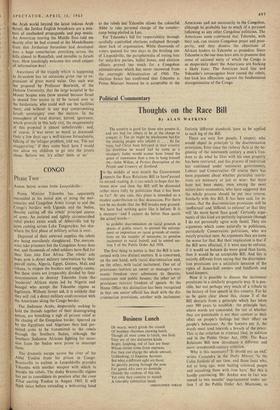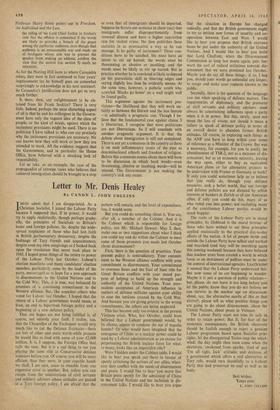Political Commentag
Thoughts on the Race Bill
By ALAN WATKINS
The country is good for those who possess it, and too bad for others to be at the charge to conquer it. The air might be wholesome but for the stinking people who inhabit it. . . . As for trees, had Christ been betrayed in their country (as doubtless he would had he come as a stranger), Judas would sooner have found the grace of repentance than a tree to hang himself on.—John Wilkes, A Perfect Description of the People and Country of Scotland.
TN the middle of next month the Government 'expects the Race Relations Bill to have' passed its second reading. Is it too mtich to hope that be- tween now and then the Bill will be discussed rather more fully by politicians than it has been so far? At any rate, this piece is intended as a modest contribution to that discussion. For there can be no doubt that the Bill breaks new ground. We have had nothing quite like it before. It is a measure—and I cannot do better than quote the actual words— to prohibit discrimination on racial grounds in places of public resort; to prevent the enforce- ment or imposition on racial grounds of restric- tions on the transfer of tenancies; to penalise incitement to racial hatred; and to amend sec- tion 5 of the Public Order Act 1936.
The first thing to notice is that the Bill is con- cerned with two distinct matters. It is concerned, on the one hand, with racial discrimination and, on the other, with racial incitement. One set of provisions restricts an owner or manager's eco- nomic freedom over admission to theatres, restaurants and public houses; the other 'set 'of previsions restricts freedom of speech. At the Home Office this distinction has been recognised in that one senior official has dealt with the dis- crimination provisions, another with incitement.
Entirely different standards have to be applied to each leg of the Bill.
There are very few people, I suspect, who would object in principle to the discrimination provisions. Ever since the railway Acts at the be- ginning of the nineteenth century a man's free- dom to do what he likes with his own property has been restricted; and this process of restriction' has continued under successive governments, Labour and Conservative. Of course there has been argument about whether particular restric- tions are necessary or just or wise: but there have not been many, even among the most laissez-faire economists, who have suggested that the whole process should be put into reverse. Similarly with this Bill. It has been said, for in- stance, that the discrimination provisions will be 'ineffectual' and 'difficult to enforce' or that they will 'do more harm than good.' Certainly argu- ments of this kind are perfectly legitimate (though I do not personally agree with them). They are arguments which come naturally to politicians, particularly Conservative politicians, who are mostly practical men. As arguments they are none the worse for that. But their implication is that if the Bill were effectual, if it were easy -to enforce, if it would on balance do more good than harm, then it would be an acceptable Bill. And this is entirely different from saying that the discrimina- tion provisions are a socialistic invasion of the rights of dance-hall owners and landlords and hotel-keepers.
Now it is possible to discuss the incitement provisions in a similarly pragmatic way. It is pos- sible, but not perhaps very much of a tribute to the history of free speech in this country. For let us be quite clear about this, clause 3 of the Bill detracts from a principle which has taken over 300 years to establish: the principle that,. where words are concerned, the test of Whether they are punishable is not their content or their effect on people's feelings but their effect on people's behaviour. As the lawyers put it, the words must tend towards a breach of the peace. This is the criterion in criminal libel, in sedition and in the Public Order Act, 1936. The Race Relations Bill now introduces a different and more seventeenth-century criterion.
Why is this necessary? 'It should put an end,' writes Cassandra in the Daily Mirror, 'to the Colin Jordans of our time, and those louts who, not so long ago, went baiting coloured people and assaulting them with iron bars.' But this is hardly convincing. Mr. Jordan was in fact sen- tenced to two months' imprisonment under sec- tion 5 of the Public Order Act. Moreover, as
Professor Harry Street points out in Freedom, the individual and the Law, the ruling of the Lord Chief Justice in Jordan's
case that the offence is committed if the words arc likely to provoke a breach of the peace
among the particular audience, even though that audience is an unreasonable one and made up of hooligans whose aim was to prevent the speaker from making an address, confirm the view that the section (i.e. section 5) needs no extension.
As for the Notting Hill louts to whom Cassandra refers, they were in fact sentenced to four years' imprisonment (as he himself goes on somewhat surprisingly to acknowledge in his next sentence). So Cassandra's justification does not get us very much further.
Is there, then, any enlightenment to be ob- tained from Sir Frank Soskice? There is very little. Indeed, perhaps the most disturbing aspect of all is that he and his colleagues in the Govern- ment have only the vaguest idea of the class of people, or the kind of words, against which the incitement provisions might be used. There is no politician I have talked to who can say precisely why the incitement provisions are necessary. No one knows how they will work or how they are intended to work. All the evidence suggests that the Government, and in particular the Home Office, have behaved with a shocking lack of responsibility.
Let us take, as an example, the case of the propagandist of extreme views who believes that coloured immigration should be brought to a stop or even that all immigrants should be deported. Suppose he ferrets out statistics to show (say) that immigrants suffer disproportionately from venereal disease and have a higher conviction rate for violent crime. He then publishes these statistics in as provocative a way as he can manage. Is he guilty of incitement? Three con- ditions have to be satisfied. He must have an intent to stir up hatred; the words must be threatening or abusive or insulting; and the words must be likely to stir up hatred. But in practice whether he is convicted is likely to depend on his journalistic skill in blurring edges and saying slightly less than be evidently means. At the same time, however, a pathetic youth who scrawled 'Blacks go home' on a wall might well be found guilty.
This argument against the incitement pro- visions—the likelihood that they will work un- fairly as between the literate and the less literate —is admittedly a pragmatic one. Though I be- lieve that the fundamental case against clause 3 is libertarian, I recognise that most politicians are not libertarians. So I will conclude with another pragmatic argument. It is that the debate about immigration is still not completed. There is not yet a consensus in the country as there is on such inflammatory issues of the past as denominational schools and freedom of religion. Before this consensus comes about there will have to be discussion in which hard words—even threatening, abusive or insulting words—will be uttered. The Government is not making the country's task any easier.































 Previous page
Previous page